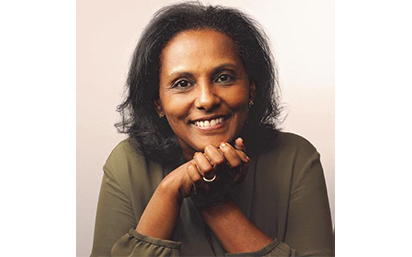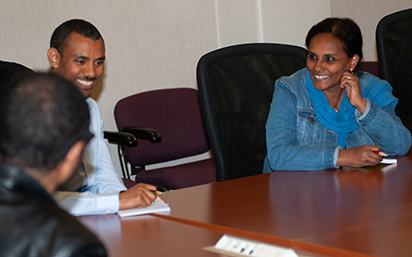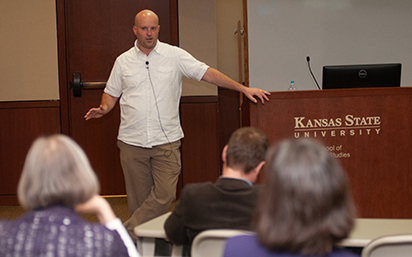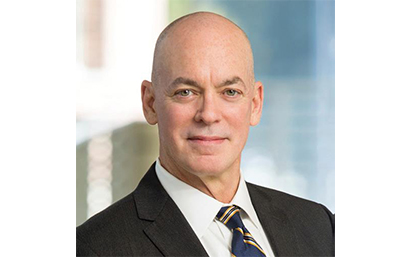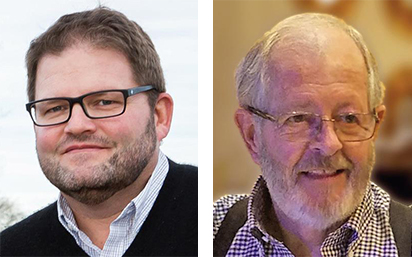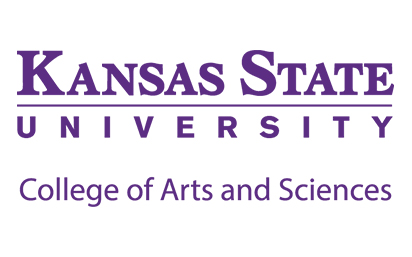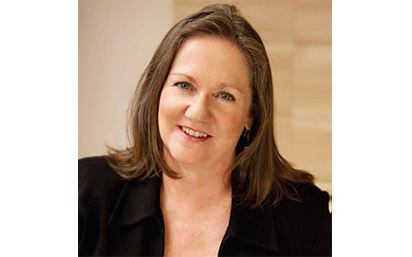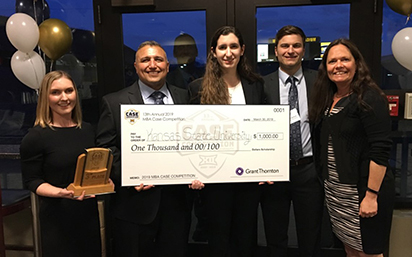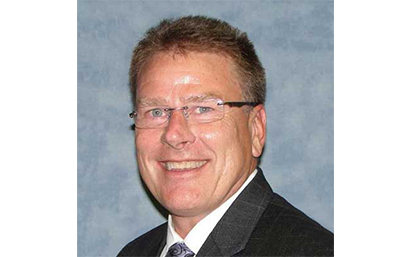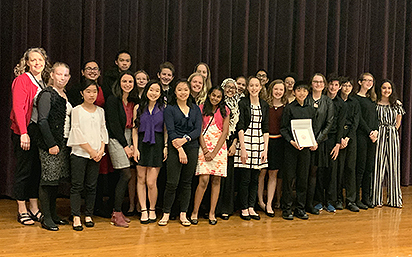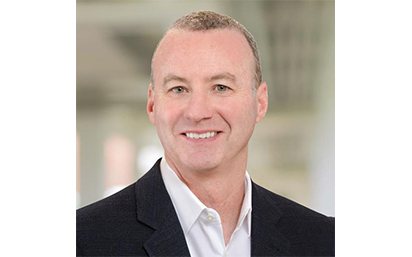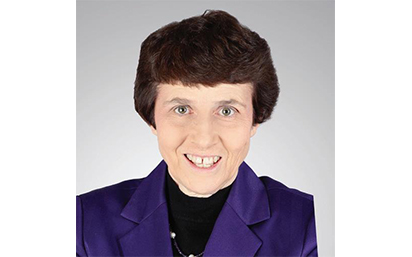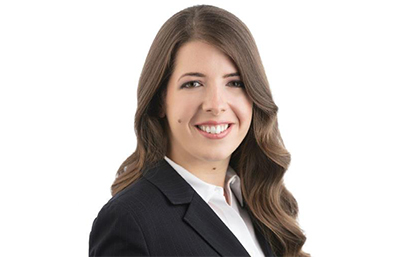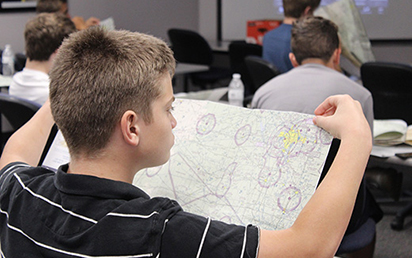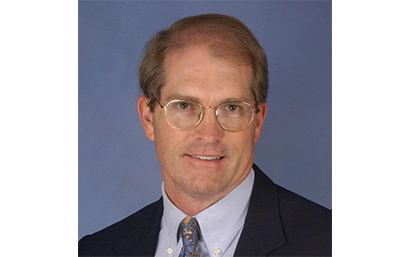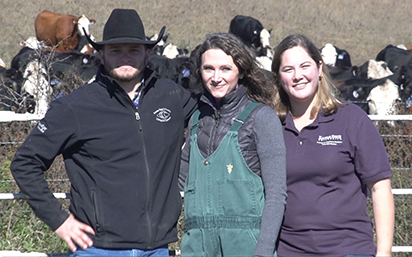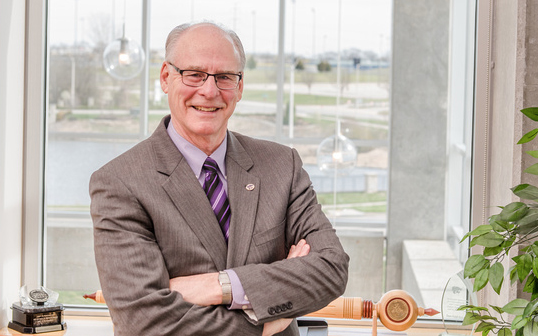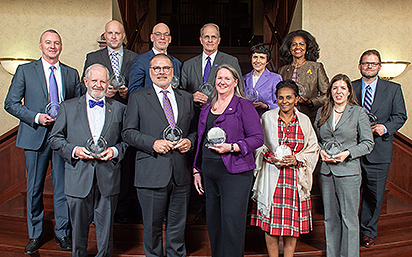
2019 Alumni Fellows connect with students on campus
Audrey Mross ’80, 2019 Alumni Fellow for the College of Business Administration, walked
around the Business Building practically beaming with happiness, because she was in
“Manhappiness” as she likes to call it on social media.
Mross and 11 other distinguished professionals were on K-State’s campuses from April
10-12 to share their industry knowledge and expertise with students and faculty members.
On April 11, while speaking to K-State students during several classes, Mross stressed
the importance of networking and maintaining a connection to K-State after graduation.
“It will give you purpose, help you network and build your career,” she said.
Mross would know a thing or two about networking. After all, she is a former member
of the K-State Alumni Association’s board of directors and served as its chair. She’s
also president of the Kansas State Texans, the K-State Alumni Club for the Dallas-Fort
Worth area.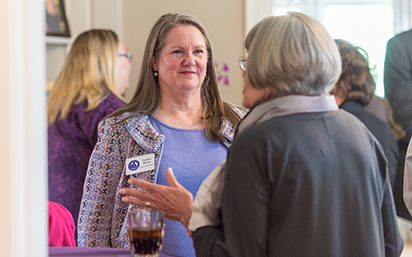 “Wear your K-State shirts when you do your errands. K-State has remained a big part
of my life, and the relationships I’ve made have followed me throughout my career.”
“Wear your K-State shirts when you do your errands. K-State has remained a big part
of my life, and the relationships I’ve made have followed me throughout my career.”
But Mross wasn’t there to promote purple pride solely; she was honored by K-State
for her work as an attorney.
Mross, Dallas, Texas, is a partner and chair of the labor and employment section with
the law firm of Munck Wilson Mandala. Prior to the practice of law, Mross was a human
resources professional in hospitality, oil and gas, and information technology.
While on campus she spent time with students to help them navigate career choices,
talk shop about life as an attorney and celebrate her alma mater.
Below, you can learn more about each of the 2019 Fellows, and also read about how
K-State prepared them for their career.

College of Agriculture
Segenet Kelemu ’89
Segenet Kelemu ’89
Director general and CEO, International Centre for Insect Physiology and Ecology
How has K-State prepared you for your career?
The environment at the Department of Plant Pathology at KSU was incredibly friendly,
nurturing and facilitated independent thinking and good science. The faculty members
treated the graduate students as equals and highly valued research contributions by
the graduate students. The graduate students when I was there were multicultural,
multinationalities coming from Asia, Africa, Latin America, the Middle East and elsewhere.
We all have been treated with respect with no feeling of discrimination. The department
was just a big diverse family, which was fun to work and to learn.

College of Architecture, Planning and Design
William Sullivan ’85
William Sullivan ’85
Professor and head of landscape architecture, University of Illinois
How has K-State prepared you for your career?
At K-State, I fell in love with landscape architecture. I launched my career at K-State,
not only earning my MLA, but also becoming an assistant professor. What an incredible
foundation for my career!

College of Arts and Sciences
John Guinotte ’96, ’99
John Guinotte ’96, ’99
Spatial ecologist, U.S. Fish and Wildlife Service
How has K-State prepared you for your career?
My dad, who also graduated from K-State, told me (before I left home for Manhattan)
he wasn’t concerned about me making good grades as long as I learned how to think for myself.
It took awhile, but by the time I left K-State this was true. I will give my kids
the same advice before they leave for college.

College of Arts and Sciences
Woody Leel ’66
Woody Leel ’66
Consulting petroleum geologist, W.G. Woody Leel Jr.
How has K-State prepared you for your career?
54 hours of geology courses gave me an excellent fundamental geologic education and
prepared me for any geological career. The faculty and staff in the KSU Geology Department
were like family.

College of Business Administration
Audrey Mross ’80
Audrey Mross ’80
Partner, Munck Wilson Mandala LLP
How has K-State prepared you for your career?
K-State’s lessons occurred both in and outside of the classroom and resulted in good
work habits (via sometimes painful relation of actions to consequences), resilience
(fall short, get up, try again), time management and an expansive and trusted network
of the best friends, colleagues and mentors one could wish for.

College of Education
John Heim ’87
John Heim ’87
Executive director, Kansas Association of School Boards
How has K-State prepared you for your career?
Besides developing a lifetime of relationships, graduate school at K-State helped
me understand the importance of learning and continuous improvement. Understanding
how much I didn’t know and allowing that to spark my sense of curiosity was the most
productive aspect of my K-State education.

Carl R. Ice College of Engineering
Kevin E. Burke ’86
Kevin E. Burke ’86
President and CEO, Burke Construction Group
How has K-State prepared you for your career?
I grew up in a small town in rural Kansas so the opportunity to attend K-State was
both challenging and intimidating. Difficult courses taught me exceptional critical-thinking
skills. It also gave me confidence knowing that I could compete with very talented
students. Most importantly it gave me the opportunity to become part of several on-campus
leadership and service organizations which enabled me to develop lifelong friendships.

Global Campus
Nathan Smit ’08
Nathan Smit ’08
Senior innovation manager, Hormel Foods Corporation
How has K-State prepared you for your career?
K-State gave me a world-class education with the flexibility to fit my life. My degree
along with hard work elevated my career to new heights.

Graduate School
Barbara W. Ballard, Ph.D. ’76, ’80
Barbara W. Ballard, Ph.D. ’76, ’80
Kansas state representative and associate director of the Dole Institute of Politics, University of Kansas
How has K-State prepared you for your career?
The counseling and student personnel services program at K-State effectively provided
diverse opportunities to work with students and others.

College of Human Ecology
Cheryl Johnson ’80, ’83
Cheryl Johnson ’80, ’83
Director of child nutrition and wellness, Kansas State Department of Education
How has K-State prepared you for your career?
The professors at K-State were caring and encouraging, and provided opportunities
that encouraged not only scholarship, but professional development, leadership and
service. The opportunities for involvement in student organizations, professional
associations and student life — for example, Blue Key and serving as a new student leader — helped prepare me to lead and serve others.

College of Technology and Aviation
Kali M. Hague ’10
Kali M. Hague ’10
Attorney, Jetlaw LLC
How has K-State prepared you for your career?
Kansas State Polytechnic worked with me to customize my Bachelor of Science. I graduated
with a unique degree in aviation that set me apart from my peers on day one.

College of Veterinary Medicine
M. Gatz Riddell Jr. ’77
M. Gatz Riddell Jr. ’77
Professor emeritus, Auburn University; Secretary general, World Association for Buiatrics
How has K-State prepared you for your career?
The Kansas State University College of Veterinary Medicine provided an excellent,
practice-oriented, broad-based education. Role models and mentors during my veterinary
education (Dr. Kent Ames, John Noordsy ’46, ’62, Albert Dorn and Russell Fry to name a few of many) provided the impetus to continue
in academia, operate in general practice and engage fully in organized veterinary
medicine.

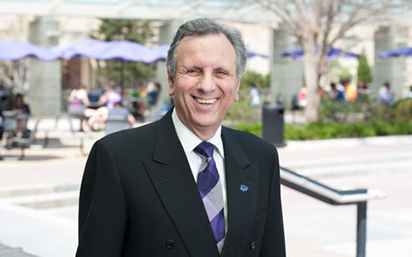
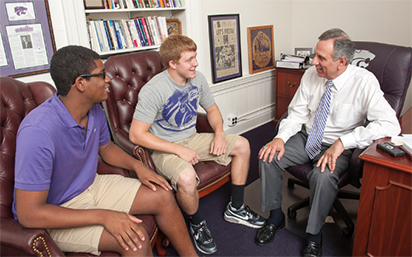
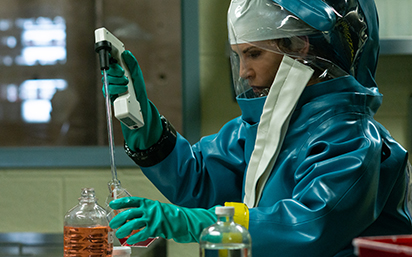
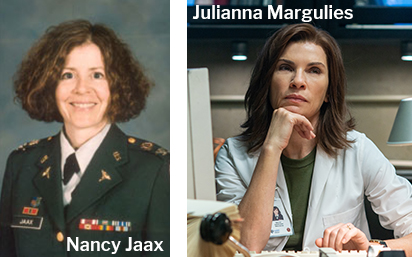 Throughout her military service career, Nancy played a vital role in the military’s
veterinary pathology, diagnostic and research programs. She managed multidisciplinary
research programs in large biomedical laboratories; directed post-graduate training
programs for veterinarians in pathology; and performed pathogenesis research with
high hazard viral agents, and bacterial, biologic toxin and chemical agents.
Throughout her military service career, Nancy played a vital role in the military’s
veterinary pathology, diagnostic and research programs. She managed multidisciplinary
research programs in large biomedical laboratories; directed post-graduate training
programs for veterinarians in pathology; and performed pathogenesis research with
high hazard viral agents, and bacterial, biologic toxin and chemical agents.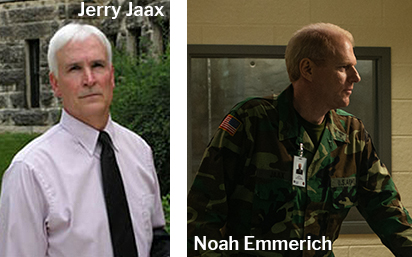 In 1998, after 26 years of active service, Jerry retired from the Army at the rank
of colonel. During his career he worked in a number of professional capacities, including
medical defense against chemical and biological warfare programs, professional mentor
for laboratory animal medicine officers, post-graduate lab animal medicine training
program director and many other duties common for a veterinary medical officer.
In 1998, after 26 years of active service, Jerry retired from the Army at the rank
of colonel. During his career he worked in a number of professional capacities, including
medical defense against chemical and biological warfare programs, professional mentor
for laboratory animal medicine officers, post-graduate lab animal medicine training
program director and many other duties common for a veterinary medical officer.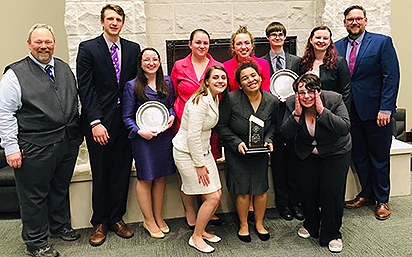
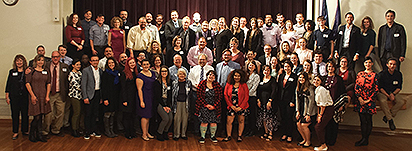 Serra, like many other Wildcats who competed at AFA-NIET, took part in an alumni to
student letter-writing campaign. Before nationals, Craig Brown ’82, ’85, director
of forensics, reaches out to K-State speech alumni and asks them to write encouraging
letters to students, which they will receive and read the night before the tournament
kicks off.
Serra, like many other Wildcats who competed at AFA-NIET, took part in an alumni to
student letter-writing campaign. Before nationals, Craig Brown ’82, ’85, director
of forensics, reaches out to K-State speech alumni and asks them to write encouraging
letters to students, which they will receive and read the night before the tournament
kicks off.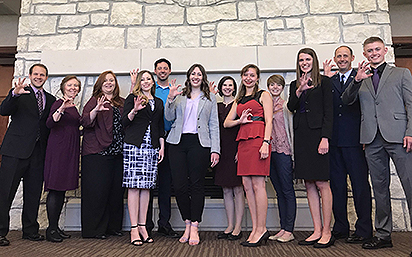
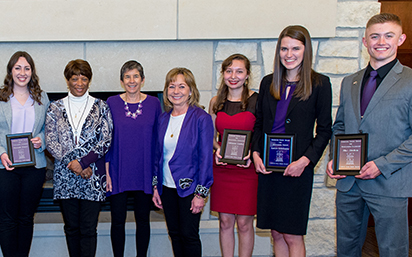 The Anderson Senior Awards recognize graduating seniors for academics, leadership,
inspiration and service. The award was established in 1998 and pays tribute to K-State’s
second president, John Anderson, who served from 1873 to 1879.
The Anderson Senior Awards recognize graduating seniors for academics, leadership,
inspiration and service. The award was established in 1998 and pays tribute to K-State’s
second president, John Anderson, who served from 1873 to 1879.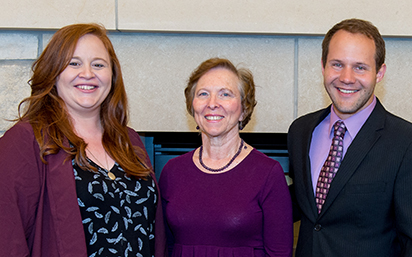 The Graduate Student Awards, established in 2010, recognize outstanding graduate students
for academics, service and leadership.
The Graduate Student Awards, established in 2010, recognize outstanding graduate students
for academics, service and leadership.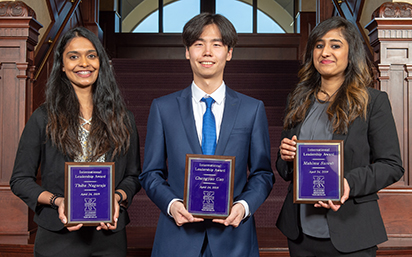 The International Leadership Awards program recognizes outstanding international graduating
students for service and leadership within the international K-State and Manhattan
communities.
The International Leadership Awards program recognizes outstanding international graduating
students for service and leadership within the international K-State and Manhattan
communities.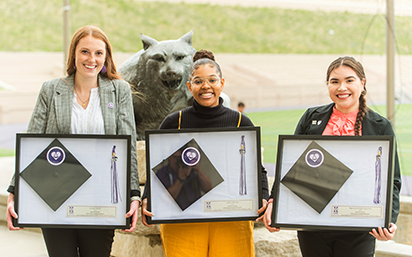 The Robinson Family Multicultural Leadership Awards recognize outstanding multicultural
graduating students who are leaving a legacy of enhancing multicultural engagement
at K-State through their leadership.
The Robinson Family Multicultural Leadership Awards recognize outstanding multicultural
graduating students who are leaving a legacy of enhancing multicultural engagement
at K-State through their leadership. Marlene Campos-Guerrero,
Marlene Campos-Guerrero,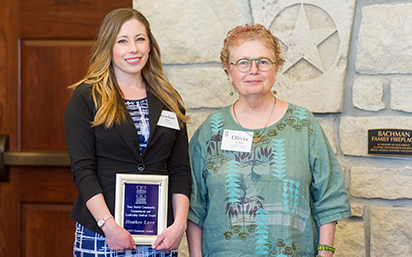 The Tony Jurich Community Commitment and Leadership Student Awards honor two graduating
students who have demonstrated a commitment to community leadership and service through
The Tony Jurich Community Commitment and Leadership Student Awards honor two graduating
students who have demonstrated a commitment to community leadership and service through
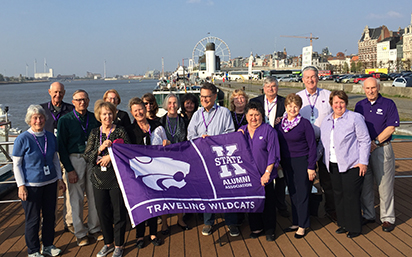
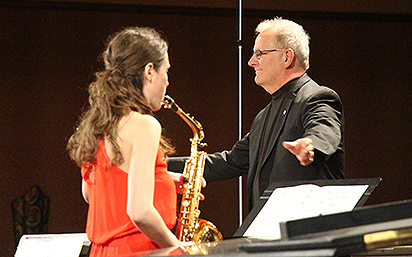
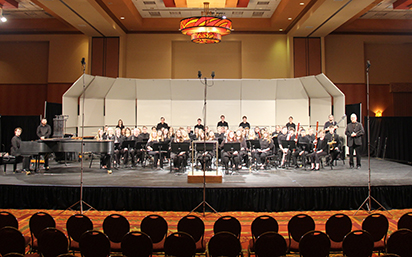 K-State has had a wind ensemble since 1995. According to Tracz, a wind ensemble is
a concert ensemble composed of the best wind and percussion musicians on campus. Because
there is only one musician to a part, a high level of responsibility and musicianship
is required of each performer.
K-State has had a wind ensemble since 1995. According to Tracz, a wind ensemble is
a concert ensemble composed of the best wind and percussion musicians on campus. Because
there is only one musician to a part, a high level of responsibility and musicianship
is required of each performer.
 The title “Purple People” may not be common, but for Bruce and Nancy Peters, that
name represents their love for their alma mater, Kansas State University.
The title “Purple People” may not be common, but for Bruce and Nancy Peters, that
name represents their love for their alma mater, Kansas State University.